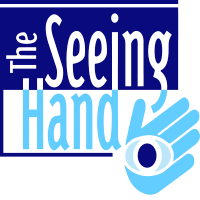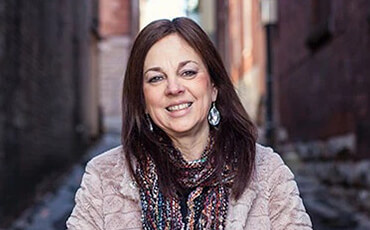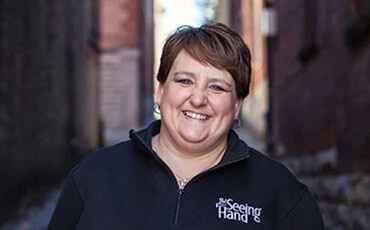About The Seeing Hand Association
The Seeing Hand Association, Inc., offers an innovative array of specialized services for the blind and visually impaired individuals. The services assist in meeting the identified needs of the individual while maintaining our core values of accountability, honesty, integrity, trust, teamwork, independence, personal and professional growth, dignity and self-esteem.
Mission & Vision
How We Help the Blind & Visually Impaired
We believe that blind and visually impaired individuals can be truly independent and achieve quality of life with the appropriate individual and family-shared services. Our services are designed to encourage, challenge, and empower individuals to maximize their potential in all areas of life. The services assist the blind and visually impaired to set personal and professional goals, learn the necessary skills to meet those goals, and provide experiential opportunities to practice new skills and build confidence in every aspect of living.
We Are Advocates
- Right to confidentiality
- Right to independence and self-respect
- Right to achieve his/her fullest potential
- Right to personal choice and decision-making for his/her own life plan
- Right to receive all available agency services
Our Team
Meet our dedicated team and expert staff from The Seeing Hand Association.
Karen Haught
Theresa Kurtz
Our Long History of Helping the Visually Impaired in the Ohio Valley
The first written history of The Seeing Hand Association was recorded on May 23, 1936. The YMCA and Director Ivan Justice were thanked for “their generosity and helpfulness to us for the past season.” They called themselves the Sponsoring Committee for the blind.
Over the next year or so members formed a board and five committees. In 1937, Justice suggested the name “The Seeing Hand” be adopted and used with the subtitle, “Ohio County Association for the Blind.” It was then proposed to hold a sale of blind products which would provide an opportunity to see the blind at work. The public has always needed educated about the ability of blind and visually impaired workers.
The organization continued to move forward and filed a charter in 1946, which was approved by the state of West Virginia. The Seeing Hand, Ohio County Association for the Blind, was the first organization in the state of West Virginia to serve the blind. In 1997 the name was changed to “The Seeing Hand Association, Inc.”
Miss Ethel Clara Elikan joined the board in 1946 and became the director in 1947. She remained the director for 50 years and passed away in 1997. Elikan worked tirelessly advocating for the blind and visually impaired in our area. In 1948, the American Legion offered to raise money to pay for property at 737 Market Street. The Seeing Hand Association remained in that location until 1997 when we moved to our current location at 750 Main Street. Our Main Street location has a workshop which was dedicated and named “The Elikan Center.”
Under Miss Elikan’s direction many programs were developed. In 1948, The Sightless Workers Guild was formed offering weaving classes, instruction for rug looms, and chair caning. In December of 1950, our first Christmas party was held and was attended by 97 people. The Rotary sponsored a blind and visually impaired bowling league in November of 1953, and we still continue to take the Cheerful Bowlers to bowl each Saturday morning from September until April. The Cheerful Bowlers were national champions for many years during the 1950’s and 1960’s.
The Seeing Hand employees learned to make mops in September of 1954. A gentleman by the name of Don Pruitt holds the record for making 34 mops in one day in March of 1955. The Seeing Hand Association continues to make mops today. In May of 1955, the agency started offering braille lessons.
In May of 1956, the first summer camp for 50 blind adults was held. Each year, we have Camp Independence for blind and visually impaired children ages 10 to 17.
Much of Elikan’s efforts focused on finding ways to sustain The Seeing Hand Association. To this day much of our funding comes from an endowment which she started.
In September of 1962, a garden was designed for the blind and displayed at a room in Wilson Lodge. The room was filled with plants and flowers. Each plant had an identification card written in English and braille.
Following the passing of Elikan, there were several interim directors, most notably board member Edwin (Ted) Spears. Following Spears, R. Alvin Schafer, Jr was the CEO/President from March of 1999 until his retirement in September of 2009. Director Schafer developed the “Advisor” newsletter and expanded the staff. He oversaw the computerization of the office and the development of Camp Independence.
Carolyn Heath become the director in 2009 until 2011. Heath was familiar with the daily struggles of a blind individual as her daughter has been visually impaired her entire life.
Karen Haught, our current director, joined us in April of 2012. Karen comes from a diverse background of business management, teaching, and non-profit management. It is her goal to find new projects for our organization and to grow the number of employees and programs.
Under her direction, we were given property on Wheeling Island, and in 2013 we developed the Edelman Garden. This lot was donated by the Edelman family with the hopes of offering our blind and visually impaired workers the opportunity to learn how to weed, plant, water, and harvest produce. Edelman Garden has many vertical elements which make it possible for our workers to navigate the garden with ease. In the summer of 2017, we doubled the size of the garden and installed braille identification plates. This project continues to be one of our most visible accomplishments, and we are very proud of how beautiful this once vacant lot has become.
We expanded our workshop in July of 2017 to refurbish fire extinguishers. This project enables us to expand employment opportunities for the blind and visually impaired and transforms our organization from one of sustainment to one of growth.
Our organization has made a huge difference in the lives of many blind and visually impaired individuals. We offer many services including low-vision products, home assessment, orientation and mobility, share group, recreation activities, braille, computer lessons, and employment. Haught believes her work at The Seeing Hand Association will never be done until all blind and visually impaired workers have the same opportunities as their sighted peers.


